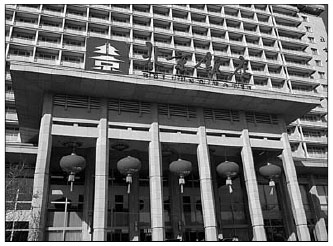|

The Beijing Hotel on the Wangfujing Street. Gong Wenbao / for China Daily
|
Tanjiacai, or Tan Family's Treat, is a renowned traditional cuisine, but who actually serves the genuine article is in dispute as two Beijing hospitality operations each claim to do it right.
And when the historic cuisine can bring a considerable fortune, things get even more complicated.
The Beijing Hotel has filed a lawsuit in Beijing No 1 Intermediate People's Court against the Beijing Shiji Tanfu Restaurant chain claiming violations of its trademarks - Tan, Tanfu and Tanjiacai - and requesting a desist order requiring the group of restaurants to stop using the names and cease serving cuisine called Tanjiacai.
"We have served this traditional cuisine since 1958 and registered the trademarks in 1996," said a senior manager at the hotel.
"Beijing Shiji Tanfu Restaurants using Tanfu on signs and traditional Tanjiacai in advertisements are obvious infringements," the manager said.
As well, "the restaurant's previous management promised the Beijing Hotel they would not provide this cuisine", he added.
The spokesman contends cooking techniques for Tanjiacai are exclusive to the Beijing Hotel because its cooks are inheritors of the time-honored knowledge needed to prepare the cuisine.
"Our dishes enjoy a renowned reputation both at home and overseas, and have also been selected as main courses at state banquets."
The famed cuisine has an elaborate preparation process.
"Its main ingredients are dried seafood, but Shiji Tanfu Restaurants use fresh seafood - which is not in the classic fashion," the hotel's manager noted.
For its part, Shiji Tanfu argues that Tanjiacai is merely the cooking style for an ancient cuisine and it should be seen as a historical heritage rather than owned by a particular individual or company.
"It is a common name just like Cantonese cuisine. The Beijing Hotel should not forbid others from serving it," said a manager at one of the restaurants.
"We have also mastered the classic skills because nine cooks came here from the Beijing Hotel in 1993, including one of the cuisine's inheritors."
Yuan Jiafang, a research professor at Capital University of Economics and Business, said Tanjiacai is a shared asset.
"Just like Peking roast duck, any restaurant or hotel should be allowed to provide these reputable traditional cuisines," Yuan said. "But they have to keep their original flavors."
That will help pass on valuable cooking skills as part of traditional culture, Yuan said.
Yet Lai Yang, general secretary of the Beijing Institute of Business Economics, said "the cooking techniques for Tanjiacai, created at the end of Qing Dynasty (1644-1911), are passed on from one generation to another, so are different from Sichuan or Shandong cuisine, - more like a brand rather than a geographic indicator".
"It is the same as KFC that claims 'we do chicken right'," he added. "But you can't call every fast-food restaurant offering fried chicken KFC."
He suggested that the Beijing Hotel pay more attention to intellectual property protection and sign confidentiality agreements with cooks.
Local media report that the two sides are now in negotiation for a possible out-of-court settlement.
China Daily
(China Daily 03/30/2011 page17)
